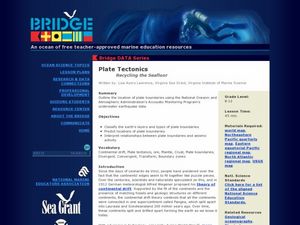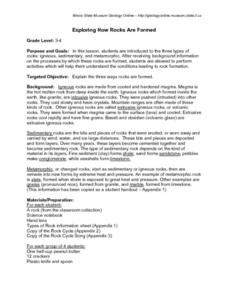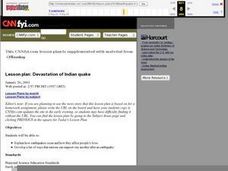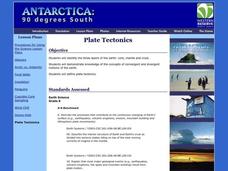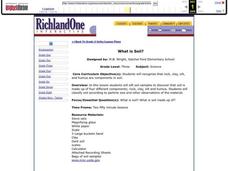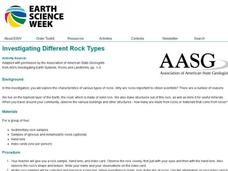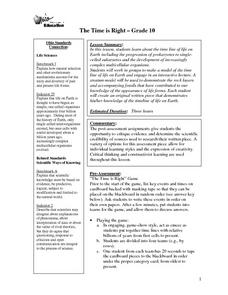Curated OER
Oil Trap Model
Students investigate oil accumulation by creating a model in their classroom. In this petroleum geology lesson, students discuss where oil comes from and why it is vital to our society at this particular time. Students cut out a 3-D...
Curated OER
Musical Plates
Sixth graders engage in a study of the plates and how they are part of the formation of the ever changing landscape of planet earth. They access web sites that have applications for observation and conducting different activities. The...
Curated OER
Plate Tectonics: Recycling the Seafloor
Students classify earth's layers and plates using Ocean Seismicity data. In this plate tectonics instructional activity, students outline where the plate boundaries are on the world map. They then compare these predicted boundaries with...
Curated OER
Exploring How Rocks Are Formed
These lessons produced by the Illinois State Museum are quite good. In this one, third and fourth graders are introduced to the three basic types of rocks: igneous, sedimentary, and metamorphic. They perform activities which help them...
Curated OER
The Formation of Coal
In this coal formation worksheet, learners read and informational sheet about coal formation. Students are given 5 short-answer questions regarding what they've read.
Curated OER
Devastation of Indian Quake
Students read an online article at CNNfyi.com to determine what happened in India after an earthquake. They determine the magnitude of this earthquake and address the issue of relief efforts from other countries.
Curated OER
Candy Quakes
Eighth graders use candy to show the effects of deformation forces on the earth's crust. In this rock and fossil formation instructional activity students construct models and simulations to describe and explain natural phenomena.
Curated OER
Air Quality Issues
Young scholars study and chart the levels of the atmosphere. They determine volume and location of the whole in the ozone layer by problem solving and drawing Antarctica.
Curated OER
Science: What Happens to Create the Lode?
Learners understand how mineral deposits are formed and why they are not evenly dispersed. They create and describe three different precipitates from four solutions simulating mineral ore deposit formation in sedimentary rock.
Curated OER
Air Quality and Transportation
Second graders study about air pollution and the effects it has on our Earth. Students tally cars on a sheet that has been categorized as follows: One person in car, two persons in car, or three or more persons in car. Students go to...
Curated OER
Plate Tectonics
Students identify the three layers of the earth: core, mantle and crust. They demonstrate knowledge of the concepts of convergent and divergent motions of the earth and an understanding of plate tectonics.
Curated OER
Mountain Building
Teacher prepares four layers of Plasticine stacking layers on top of each other to create a model of how rocks within the earth can be folded creating anticlines and synclines below the surface and mountains and valleys on the surface.
Curated OER
Fossil Formation
Students discuss fossils. In this science lesson, students simulate fossils within Earth's layers by using gummy fish and bread.
Curated OER
Cupcake Core Sampling
Students discuss core samples. In this environment instructional activity, students experiment discovering what is beneath the surface by using cupcakes as models finding out what sort of layers are found within the cupcakes.
Curated OER
As the Sun Burns
Learners examine the types of light the sun gives the Earth. They describe the electro-magnetic spectrum and how to protect themselves from different types of light. They identify the layers of the atmosphere as well.
Curated OER
Our Solar System
Students analyze the theories of the formation of the universe and solar system. Students analyze planetary motion and the physical laws that explain that motion: Rotation, Revolution, Apparent diurnal motions of the stars, sun, and...
Curated OER
Pollution - What is It Doing to Us?
Students recognize some forms of pollution. In this science lesson plan, students recognize and understand some of the devastating effects of the acid rains and other possible factors that are contrary to the pH balance of nature.
Curated OER
Trouble in the Troposphere
Students Use data sets from MY NASA DATA to produce graphs comparing monthly and yearly ozone averages of several U.S. cities. They analyze and evaluate the data and predict trends based on the data. In addition, they discuss and...
Curated OER
What is Soil?
Third graders examine what makes soil by creating a Venn Diagram. For this Earth environment lesson, 3rd graders identify the different components that soil is made from. Students bring soil from their homes to examine and create a...
Curated OER
Temperature in The Atmosphere
In this science worksheet, students find the answers to the five questions and they fill in the graphic organizer for the temperatures found in different heights of the atmosphere.
Curated OER
Forces and Newton's Laws Unit
Students participate in lessons on Forces and Newton's Laws by selecting activities and assignments to complete in a Layer Unit. Students select assignments and activities in the C Level, B Level, and A Level.
Curated OER
Investigating Different Rock Types
Students analyze a rock using their eyes and then a hand lens. In this science lesson, students determine and discuss how hard or how easy it was to find and classify the assigned rock. Students record their observations on an index...
Curated OER
The Time is Right
Tenth graders study the timeline of life on Earth. They learn about the progression of prokaryotes to single celled eukaryotes and the development of increasingly complex multicellular organisms.
Curated OER
Bill Nye- The Atmosphere
In this science worksheet, young scholars look for the words that fill the blanks to cover the concept of the atmosphere. The activity is meant to be a review.
Other popular searches
- Science Earth Layers
- Earth Science Earth's Layers
- Earth Science Earth Layer
- Science Layers of the Earth




